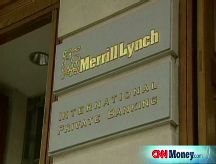Analysts: Citi can shake $7B settlement
Repurchase of more than $7 billion in auction-rate securities by Citigroup will hit earnings by just a few cents a share, according to experts.
NEW YORK (CNNMoney.com) -- Citigroup's decision to buy back more than $7 billion in auction-rate securities as part of a settlement with state and federal regulators may not be another huge problem for the beleaguered bank.
Earlier Thursday, Citigroup (C, Fortune 500) agreed to repurchase cash-equivalent investments called auction-rate securities that were sold to individual investors, small businesses, and charities at a time when the market for these investments were under severe strain.
Auction-rate securities are long-term bonds that hospitals, cities and corporations sell at weekly or monthly auctions, which many investors, until now, had treated like cash investments. Citigroup is estimated to be a leader in this market worth about $330 billion.
Apart from a $50 million civil penalty due to New York state and a separate $50 million penalty to the North American Securities Administrators Association, Citigroup stressed that the impact of the repurchase would have a "de minimis" impact on the company's balance sheet.
Citigroup estimated that based on today's values, the company would have to take a $500 million pre-tax charge as a result of repurchasing the securities.
"It is not going to be too terribly detrimental for them," said Chris Armbruster, senior research analyst at Al Frank Asset Management in Laguna Beach, Calif., which owns shares of Citigroup.
But Wall Street begged to differ. Shares of Citigroup fell more than 6% Thursday.
Gary Townsend, a former bank analyst at Friedman, Billings, Ramsey, who now serves as the president of the Chevy Chase, Md.-based Hill-Townsend Capital, said he expected the charge and penalties to lower earnings per share in the third quarter.
"It may just be a few cents, but Citi will have to step in and eat it and it will be a charge," he said.
Unlike mortgage-backed securities, however, which may recover at some point when housing prices finally bottom out, the market for these securities may never recover, notes Townsend.
In some ways, Thursday's announcement effectively put another difficulty behind Citigroup as it grapples with the credit crisis. One analyst said that new CEO Vikram Pandit, who is attempting to turn around the banking giant, now has one less thing to worry about.
"To be able to take one of these problems that Citi is wrestling with and begin to put it behind them is actually a positive," said Tom Kersting, financial services analyst at the St. Louis, Missouri-based Edward Jones.
Last month, Citi booked a $2.5 billion quarterly loss Friday as it wrote down the value of its subprime-related investments and ramped up its loan loss reserves.
Following Citi's announcement and a separate settlement Thursday by Morgan Stanley (MS, Fortune 500) to reimburse two Massachusetts municipalities $1.5 million, similar settlements could follow.
In fact late Thursday Merrill Lynch (MER, Fortune 500) said it too would buy back $12 billion in auction-rate securities from more than 30,000 retail investors.
Merrill, which acknowledged in a press release Cuomo's efforts to resolve the auction-rate securities problem, said its clients would have a year, beginning on Jan. 15, in which to sell their securities to the firm.
Massachusetts state securities regulators have also filed similar suits against the Swiss bank UBS (UBS) and charged Merrill Lynch with fraudulently promoting auction-rate securities.
And in June, Missouri state securities regulators inspected the offices of Wachovia Securities in St. Louis seeking documents related to the sales of auction-rate securities. Wachovia Securities is a subsidiary of Wachovia (WB, Fortune 500), the nation's fourth-largest bank.
"This is certainly an issue for these companies," said Kersting. "Citi being the first provided the template for many other companies to follow suit." ![]()







